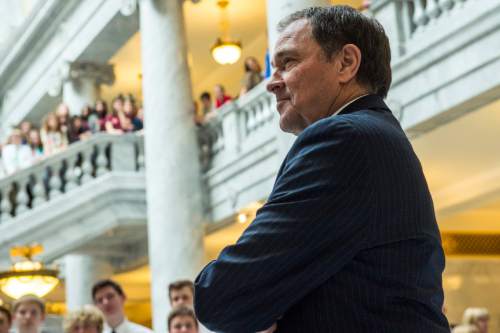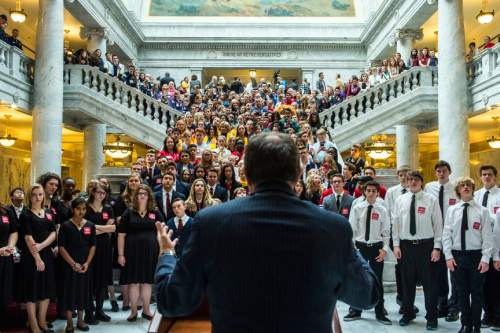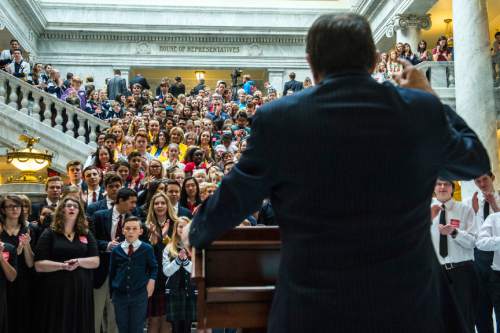This is an archived article that was published on sltrib.com in 2016, and information in the article may be outdated. It is provided only for personal research purposes and may not be reprinted.
Moroni Alvarez attended traditional public school until fifth grade, when a move placed his family near Freedom Preparatory Academy in Provo.
Now seven years later, the high school senior said he appreciates the emphasis on technology, leadership and service at his charter school.
But he also acknowledged there are some drawbacks that stem from the school's comparably small student body.
"In my class the ratio of boys to girls is like four-to-one," he said. "No. Five-to-one."
Alvarez was among hundreds of charter school students who visited the Utah Capitol on Wednesday in an annual event known as Charter Day on the Hill.
The state's charter school community filled the Rotunda, allowing students, teachers and administrators to meet with their representatives and senators, who are poised to make an investment of more than $30 million in charter education through changes to school funding formulas.
One of every 10 Utah public education students now attends a charter school, and the growth of the alternative schools has driven a debate over how, and how much, charters should be funded.
That debate has included questions of transparency, as charters enjoy greater budget autonomy than their school district counterparts and are overseen by unelected governing boards.
On Tuesday, a Senate committee narrowly approved a bill that would allow the state school board to require transparency from private, third-party companies that sell educational services to schools.
The bill would apply to contracts at any public school, but charters, because of their size, are more prone to hand over management of educational services to private entities.
"It's more prevalent in the charters," said Angie Stallings, associate state superintendent. "Should you be allowed to just take a large portion of your funding and hide it in a private company?"
Utah's charter growth has been assisted by more than $23 million in federal start-up grants, according to data released in December by the U.S. Department of Education. Since 2006, 75 Utah charter schools received grants, ranging from roughly $62,000 to more than $500,000, according to the data.
Hawthorn Academy received $538,133, which Swenson said was used for initial purchases like furniture, bleachers and classroom technology.
Several charter administrators participating in Wednesday's event at the Capitol were unable to describe how their grants were used, with most saying the money was received prior to their tenure.
Under state law, each individual charter school functions as its own school district, with the same budget and reporting requirements as their traditional district counterparts.
While school districts regularly contract with companies, charter schools have been known to hand over the day-to-day operation of a school, and the bulk of its budget, to a private firm.
Stallings said that can lead to cases where a charter school's public budget consists of a single line item: a payment to a private entity whose use of taxpayer dollars isn't subject to open records laws.
"They've essentially taken 100 percent of the state funds and given it to a private school," she said.
That level of contract work is rare, Stallings said, but it is common for a charter school to hire a company for its accounting, curriculum and administration.
And while most schools are able to provide a full accounting of expenses, she said, others have entered into contracts with providers unwilling to answer for the public funding they collect.
She pointed to a recent case where a private firm held the enrollment data for a school district, or the 2014 audit that exposed Utah's so-called "ghost students," in which private online education companies misrepresented their services and recruited students through cash rewards in the form of reimbursements for laptops and music lessons.
"Some of these small charter schools don't necessarily have the knowledge, the experience or the resources to go toe-to-toe with the third-party providers," she said.
SB91 seeks to address those issues by allowing the state school board to create a rule requiring a charter or school district to write transparency protections into its contracts.
The district or charter would be responsible for collecting records from contractors, and the state school board would have the power to withhold funding when problems arise.
David Crandall, chairman of the state school board, said the intention is not to audit the budget of every education service provider in the state, but to create an incentive for good behavior and help the school board verify the accuracy of school reports.
"We're just making sure that the money being spent on requirements under law is fulfilling those requirements," Crandall said.
After an hour of debate on Tuesday, the Senate Education Committee approved the bill in a 4-3 vote.
Among the opposing votes was South Jordan Republican Sen. Lincoln Fillmore, whose company, Charter Solutions, provides the type of third-party services targeted by the bill.
During debate, Fillmore questioned the language of the bill, suggesting it would allow the state school board to audit website developers or snow removal companies hired by a school.
"Why is this statute written so broadly that it would include all of those things?" he said.
Howard Headlee, chairman of the state charter school board, said any issue of budget transparency is the result of poor cooperation between the state school board and the charter board.
"If they need something from one of our schools, they just need to ask and we can get it for them," Headlee said. "If there is a problem, we just need to communicate better."
But Stallings said the inability to ensure compliance with state law weakens the state school board, which is empowered under the Utah Constitution with the general control and supervision of the state's education system.
"If the Legislature wants us to oversee public education, we need the power to verify the data is correct," she said.
Twitter: @bjaminwood











